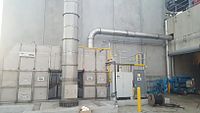
Photo from wikipedia
Sustainable production of renewable fuels has become an imperative goal but also remains a huge challenge faced by the chemical industry. A variety of low-value, renewable sources of carbon such… Click to show full abstract
Sustainable production of renewable fuels has become an imperative goal but also remains a huge challenge faced by the chemical industry. A variety of low-value, renewable sources of carbon such as wastes and by-products must be evaluated for their potential as feedstock to achieve this goal. Hydrogenation of blends comprising waste animal fat (≤70 wt%) and low-value fluid catalytic cracking light cycle oil (≥30 wt%), with a total aromatic content of 87.2 wt%, was studied on a commercial sulfided NiMo/Al2O3 catalyst. The fuel fraction in the diesel boiling range was separated by fractional distillation from the organic liquid product obtained from the catalytic conversion of the blend of 70 wt% waste animal fat and 30 wt% light cycle oil. Diesel fuel of the best quality was obtained under the following reaction conditions: T = 615-635 K, P = 6 MPa, LHSV = 1.0 h-1, H2/feedstock ratio = 600 Nm3/m3. The presence of fat in the feedstock was found to promote the conversion of light cycle oil to a paraffinic blending component for diesel fuel. Thus, a value-added alternative fuel with high biocontent can be obtained from low-value refinery stream and waste animal fat. The resultant disposal of waste animal fat, and the use of fuel containing less fossil carbon for combustion helps reduce the emission of pollutants.
Journal Title: Journal of environmental management
Year Published: 2018
Link to full text (if available)
Share on Social Media: Sign Up to like & get
recommendations!